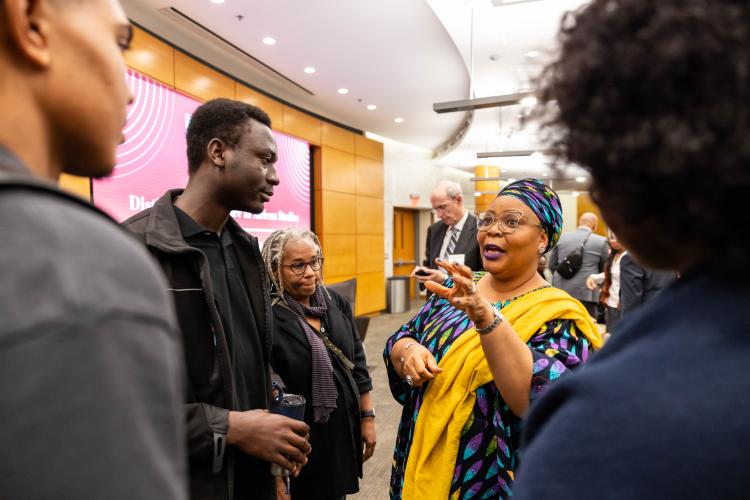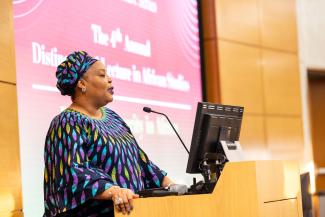
On October 21 the Center for African Studies welcomed Nobel Peace Laureate Leymah Gbowee as our fourth annual Distinguished Lecturer. A renowned Liberian peace activist, Gbowee played a pivotal role in ending the Liberian Civil War through her leadership in organizing women, which contributed to the historic election of Africa’s first female president, Ellen Johnson Sirleaf. In her talk, titled "Peace and Security," Gbowee drew on her personal experiences and insights in ending the second civil war, which were illustrated in the acclaimed documentary Pray the Devil Back to Hell. After her talk she engaged in an insightful exchange with Africana Studies professor, Jasmine Johnson and a Q&A with the audience. The attendees were all energized and inspired by her talk.
Photos by Eddy Marenco
Our 4th Distinguished lecture in African Studies was delivered by Nobel Peace Laureate Leymah Gbowee. A renowned Liberian peace activist, Gbowee played a pivotal role in ending the Liberian Civil War through her leadership in organizing women, which contributed to the historic election of Africa’s first female president, Ellen Johnson Sirleaf. In her talk, titled "Peace and Security," Gbowee drew on her personal experiences and insights in ending the second civil war, which were illustrated in the acclaimed documentary Pray the Devil Back to Hell.
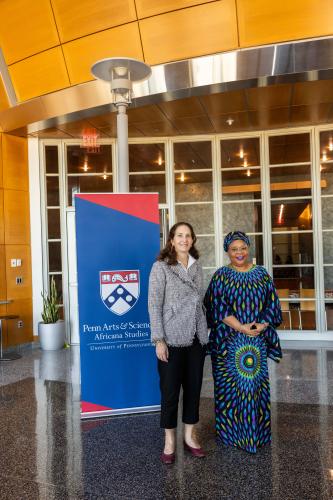 |
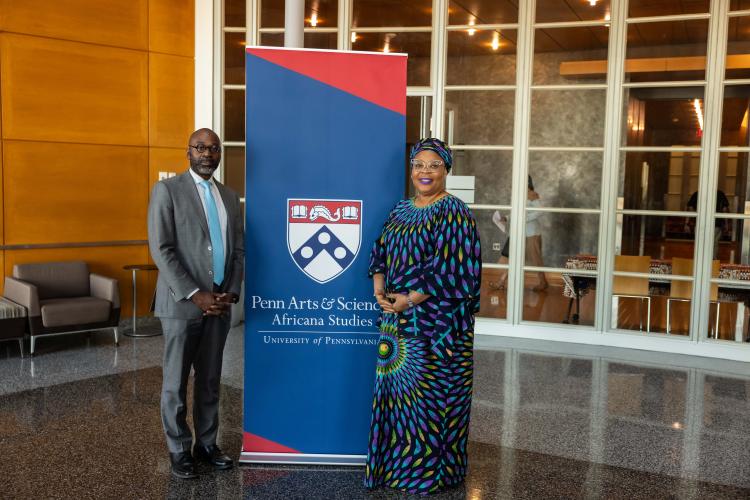 |
Provost John Jackson provided an incisive welcome which cited success across the African continent in the reduction of extreme child poverty and healthy economic growth. He pointed out that these indices belied the alarming reality of violence and unrest. The presence of state and non-state actors (internal and external), food insecurity, and climate change all contribute to the presence of conflicts. CFAS Director Wale Adebanwi drilled down on these themes in his introduction of Madam Gbowee. Professor Adebanwi pointed out that the the 21st century movements against war, corruption, and authoritarianism in the Arab Spring, Black Lives Matter movement, and Myanmar, were all preceded by the Liberian Women’s Peace Movement. Importantly Adebanwi noted the action of the Liberian women not simply as a matter of an historical timeline, but as a matter of precedence.
Madam Gbowee expanded on the welcome and introduction by Provost Jackson and Professor Adebanwi to extoll the rich and complicated history of Liberia - A history defined by corrupt America-Liberian leadership up until 1980. She was determined to reinforce throughout her talk that “my grandmother taught my sisters and I to claim our space in the world and to never back down from a fight,” to counter “a global narrative of the African woman cultural suppression.” The early lessons of her grandmother transformed her into someone whose life would be defined by fighting the dispossessed and oppressed. At one point she opined “one just needs to look oppressed, and I will be there to speak.”
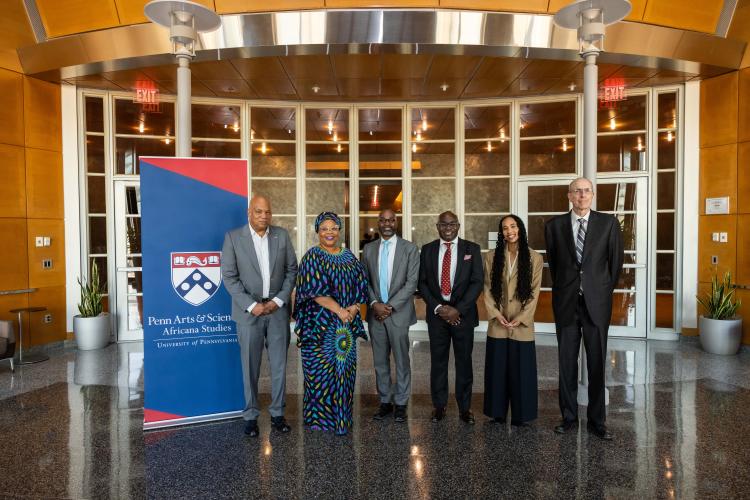 |
 |
It is this spirit that defined her life and was amplified in her talk. Although the women of Liberia were confronting a tradition of women never being allowed to participate in political decision making, they successfully stepped out in the mid-1990s to ask for peace. Their ability to connect with child soldiers helped them put their arms down. Madam Gbowee made it imminently clear that “the UN Peacekeepers from Texas and Kosovo could not deliver peace in Africa…It was the women of Liberia who got the child soldiers to put down their weapons.”
The Q&A portion was moderated by Africana Studies professor Jasmine Johnson, and shed light on complex issues of masculinity, war, and international solidarity. Madam Gbowee addressed the intersection between gender and violence and how war perpetuates harmful constructs of masculinity. In response to Johnson's question about the connection between masculinity and war, Mrs. Gbowee shared personal and professional insights that illustrated the deep-rooted and problematic socialization of young men in violent contexts.
She began by recounting a conversation with her son, who struggled to integrate into social life after returning to Liberia from Ghana, where the family had lived as refugees. Her son questioned why young men’s social standing seemed to be determined by how many women they had slept with, a disturbing yet common reality for many men in his peer group. Gbowee connected this anecdote to her experiences working with child soldiers during Liberia's civil war. She explained how a young soldier initially denied participating in sexual violence but later, when questioned differently, admitted to forcing women into sexual acts—redefining his understanding of what constituted violence.
Madam Gbowee emphasized how this behavior is not isolated to war-torn regions. She shared a parallel encounter in a non-war country where a young boy dismissively claimed that women were only good for having babies. Gbowee argued that even if this boy had never been exposed to war, his understanding of women's roles mirrored that of the child soldier—suggesting that toxic masculinity transcends wartime environments. Her reflection on these examples highlighted how entrenched social norms of masculinity can drive violence, whether in conflict zones or peaceful societies.
The discussion then shifted to the broader topic of internationalism and the role of women’s peace movements. Professor Johnson prompted Madam Gbowee to reflect on the significance of international solidarity in the Liberian women's peace movement, as depicted in the documentary Pray the Devil Back to Hell. It was here that Madam Gbowee underscored the vital importance of cross-national collaboration among women. Drawing inspiration from the Aba Women’s Riot in Nigeria, she explained that the Liberian women’s movement was shaped by historical examples of women's resistance across Africa.
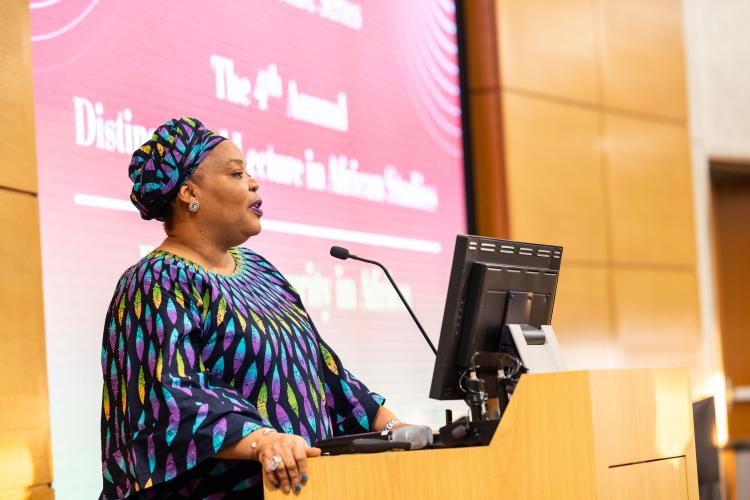 |
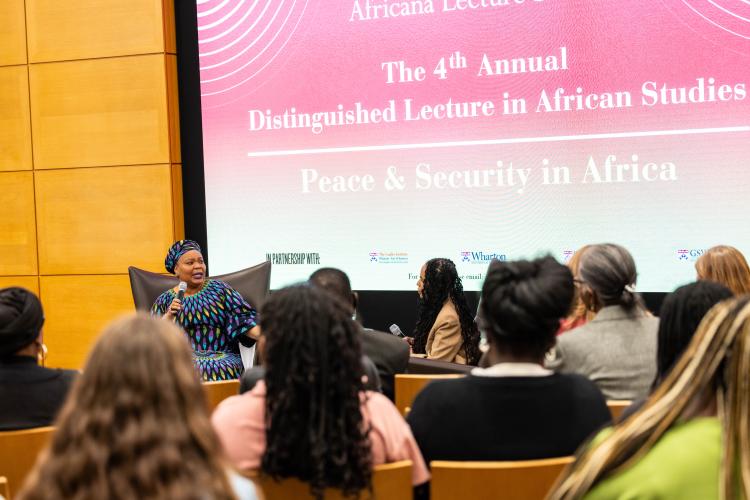 |
Solidarity across borders was crucial during the Liberian peace movement. Gbowee described how women from northern Ghana, then engaged in their own conflict, joined Liberian women in protests, motivated by the hope that if their conflict worsened, Liberian women would reciprocate. This collective approach was integral to the movement’s success. However, Madam Gbowee noted the lack of support from the diaspora during the early stages of their efforts. It wasn’t until the success of the movement became evident that diaspora women began to use the Liberian model as inspiration for their own activism in other African countries and beyond.
Gbowee also shared the international ripple effect of Pray the Devil Back to Hell, which sparked peace-building efforts worldwide. Powerfully, she recalled screenings in Israel and Palestine, where the documentary provoked differing reactions from both Israeli and Palestinian women. While Israeli women initially found the film unreflective of their reality, Palestinian women expressed frustration that African women had been able to mobilize for peace while they had not. However, over time, both groups came together, inspired by the documentary, and began organizing a collective movement. By 2016, Gbowee visited Israel, where she witnessed tens of thousands of Palestinian and Israeli women uniting in peaceful protest, declaring that "the other way is women and collective peacebuilding."
Gbowee concluded by highlighting the enduring influence of the Liberian women's peace movement and the documentary on global peace efforts. Whether in Israel, Palestine, or other parts of the world, women have drawn inspiration from the film to push for peace in their own contexts. The Q&A session underscored the interconnectedness of gender, war, and international solidarity, showcasing how women's movements can reshape societal norms and foster global peace.
In sum, the 4th Annual Distinguished Lecture in African Studies and discussion between Gbowee, Johnson, and the audience illuminated the ongoing challenges posed by war and recovery, peacebuilding, and masculinity in perpetuating violence and the power of women-led peace movements to foster change across borders. Madam Gbowee’s experiences emphasized the urgent need for societies to redefine gender roles and build peace from a foundation that is both local and inclusive of international solidarity.
